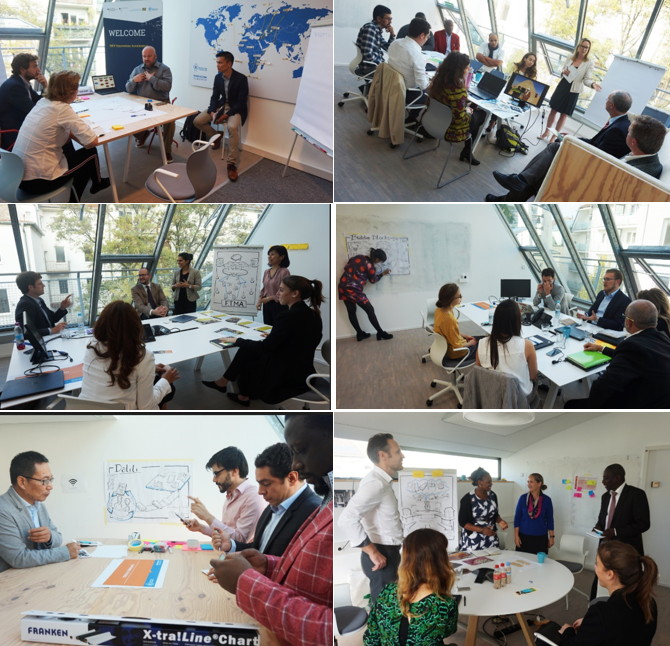First Executive Board visit to the WFP Innovation Accelerator in Munich on 8 October 2018.
A delegation of 14 WFP Member States representing 13 countries visited the WFP Innovation Accelerator in Munich on Monday, 8 October 2018. This was the first time for WFP Executive Board members and observers to see for themselves “where innovation happens” (Robert Opp, Director Innovation and Change Management Division). Funding for the Accelerator is provided by the German Federal Government and the Bavarian State Ministry of Food, Agriculture and Forestry, along with access to relevant networks.

In his introductory presentation, Bernhard Kowatsch, Head of Innovation Accelerator, explained that the team in Munich works on identifying, promoting and upscaling innovative approaches to achieving Zero Hunger. However, none of this would succeed without implementation in the field. This is why new projects are run as pilots in order to test their potential in specific contexts.

During the visit, H.E. Dr. Seidenberger, Ambassador and Permanent Representative of Germany to the Rome-based UN Agencies, acknowledged that “we need fresh ideas and creative ways to achieve Zero Hunger” and to overcome challenges to the humanitarian sector. Eight presentations of participants in a Scale-up Bootcamp gave practical insights into what it means to develop such ideas and where partners can join in to support them.
A panel discussion in the afternoon highlighted incentives and obstacles to innovations not only within WFP but also in the public and private sectors. H.E. Dr. Hinrich Thölken, Special Representative for International Digitalisation Policy and Digital Transformation at the German Federal Foreign Office in Berlin, said that we had to become new nomads, giving up stability and accept constant change. Rehan Asad, WFP Chief of Staff, stressed the responsibility of leadership in removing obstacles, inspiring innovators to move forward. Building upon her previous lightning talk on best practice in innovation and technology in private sector, Thavy Staal, Sustainability and Project Manager at BASF, referred to the importance of multi-stakeholder involvement and participation throughout the process. Breaking a project up into small wins also helps to keep a cross-functional team excited and motivated during the lengthy process of changing work cultures and achieving a mind shift, according to Sandra Raad, focal point for the project idea “Tech for Food”. Dr. Heino Meerkatt from the Boston Consulting Group said his company was “more than happy to team up” with WFP, thanks to its unique approach to fostering innovation. Mr. Opp concluded the discussion by pointing out that a change was needed, moving from an approach of preventing any kind of risk to recognizing that not inventing poses a risk in itself these days.

The delegation had the opportunity to interact with all teams of the Bootcamp during a mentoring world café to learn more about the initiatives and offer advice:

For more information, please visit: https://executiveboard.wfp.org/meeting/576
